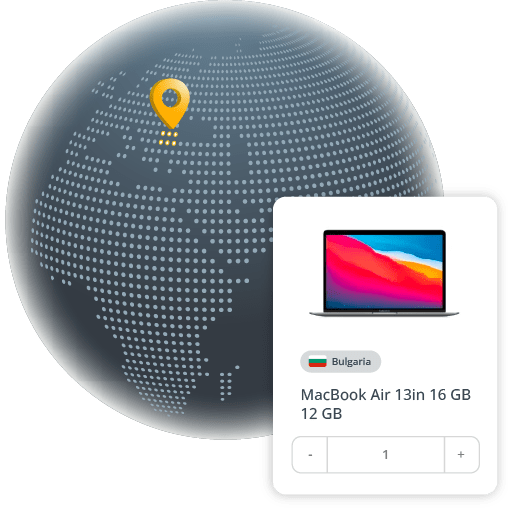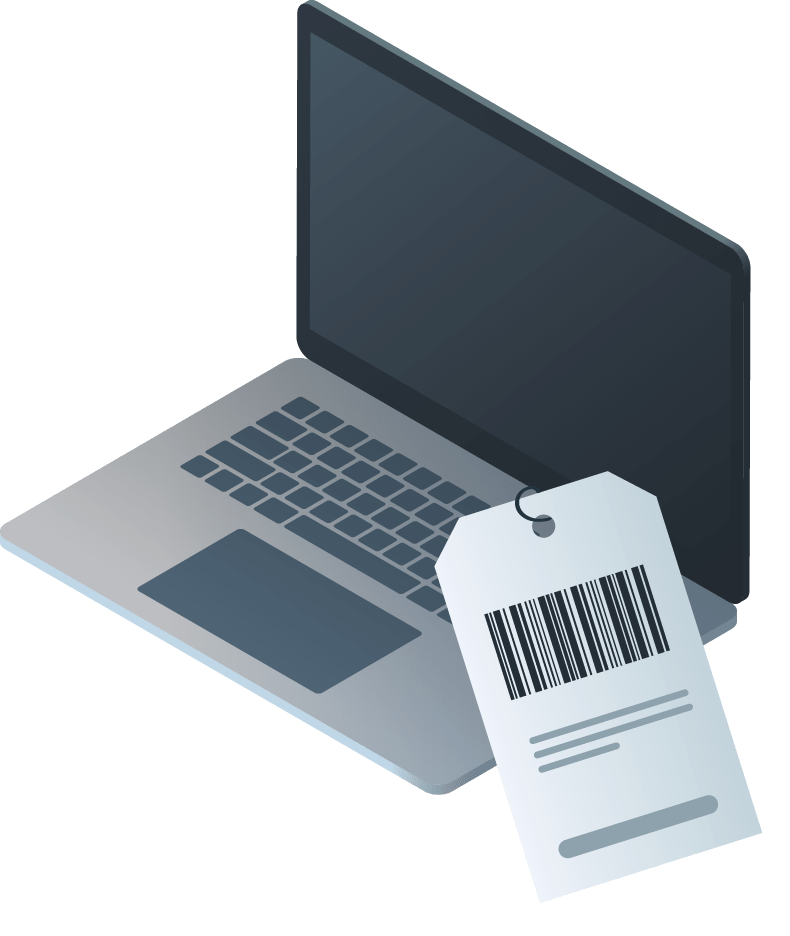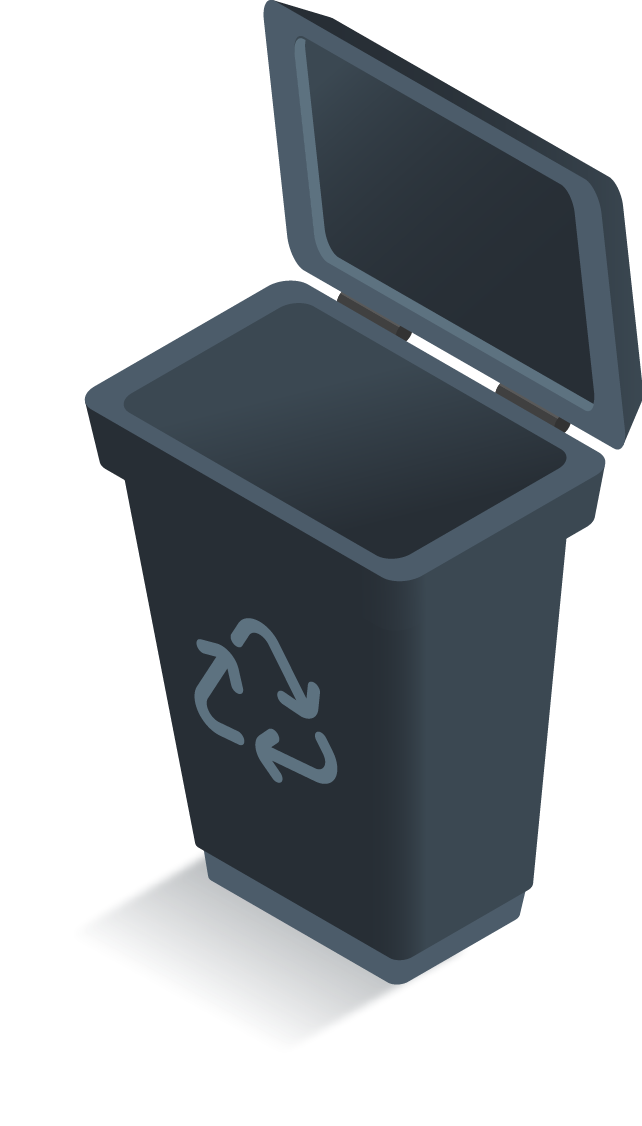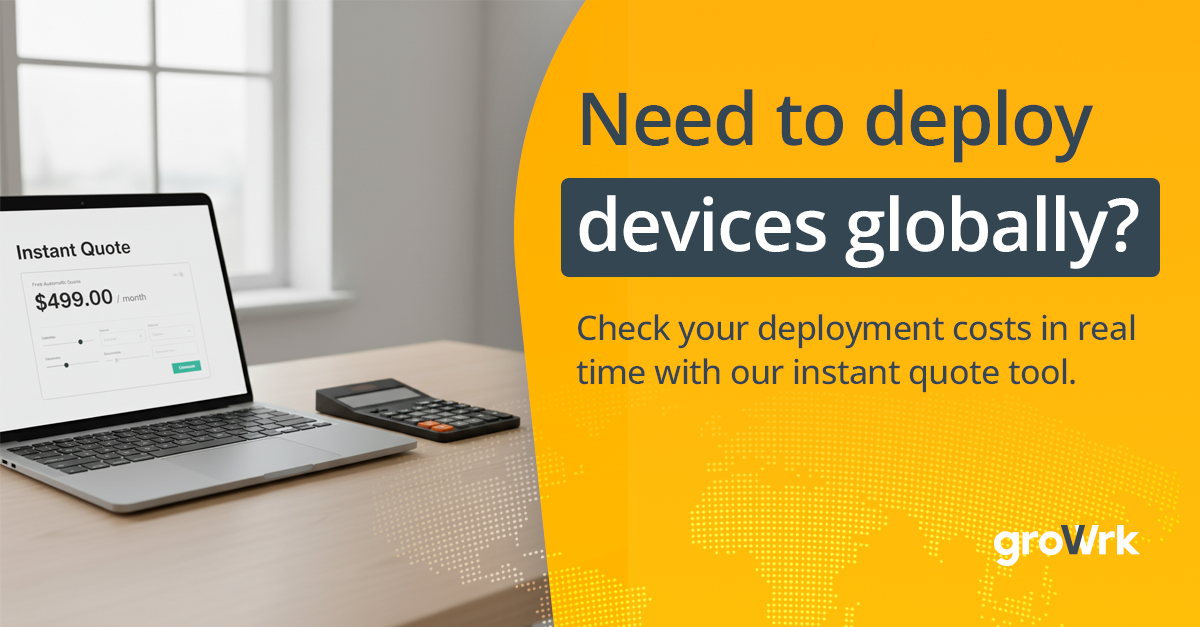How to send IT equipment to Bulgaria
Looking to send IT equipment to your remote teams in Bulgaria? GroWrk simplifies cross-border IT asset management, making it seamless and stress-free. Whether you're shipping laptops, servers, or other critical technology, we handle it all, ensuring smooth delivery right to your teams in Bulgaria.

At a glance
Bulgaria, nestled in Southeastern Europe, is a rising star in the global tech landscape, known for its competitive economy, modern IT infrastructure, and a booming technology sector. As a key player in the outsourcing industry, Bulgaria continues to attract international businesses seeking efficient, cost-effective solutions without sacrificing quality.
|
CURRENCY Bulgarian Lev (BGN) |
OFFICIAL LANGUAGE Bulgarian |
TIME ZONE Eastern European Time (EET) GMT+02:00 Eastern European Summer Time (EEST) GMT+03:00 during daylight saving time |
|
CUSTOMS DUTY ON ELECTRONICS 20% VAT Generally 0-5% customs duties with a VAT rate of 20%, although there may be exemptions for specific goods or under certain conditions |
SHIPPING LEAD TIME 3-7 days (depending on location and shipping method) |
IT OUTSOURCING MARKET Revenue in the IT services market is expected to grow at an annual rate of 6.08% from 2025 to 2029. |
Overview of IT operations in Bulgaria

A digital innovation leader: Bulgaria is advancing rapidly in digital innovation, with a significant portion of the population actively utilizing online services. 92.1% of Bulgarian households will have internet access. The country’s commitment to digital transformation spans sectors such as fintech, e-commerce, and the tech startup ecosystem, driven by both government and private sector initiatives, making it a prime location for businesses looking to grow and expand.
Robust IT infrastructure: Bulgaria is positioning itself as a key player in the tech world, thanks to its high-speed internet and increasing number of data centers. This makes it an ideal hub for cloud computing, hosting services, and international businesses seeking to optimize their digital operations and expand into Eastern Europe.
Sustainability focus: Bulgaria is taking significant strides in creating a more sustainable IT sector. Government programs and incentives are promoting eco-friendly IT solutions, encouraging businesses to reduce their carbon footprints and adopt green technologies, which is not only beneficial for the environment but also aligns with the global shift towards sustainability.
Skilled workforce: Thanks to the country’s growing emphasis on tech education, Bulgaria is home to a highly qualified workforce. With expertise in software development, cybersecurity, IT systems, and coding, Bulgaria provides businesses with access to a reliable talent pool, ready to drive innovation and technological advancement.
Business-friendly environment: Bulgaria offers a supportive regulatory framework, featuring tax policies that benefit businesses and robust data protection laws. The country is renowned for its welcoming environment for foreign investment, fostering a vibrant entrepreneurial ecosystem that encourages international partnerships and business expansion.
A strong cybersecurity framework: As cyber threats evolve, Bulgaria is strengthening its cybersecurity laws and practices. The government is proactive in creating a secure digital environment, ensuring that digital systems, infrastructure, and sensitive data are protected, which is critical for businesses operating in an increasingly digital world.
Thriving tech ecosystem: Cities like Sofia and Plovdiv are emerging as vibrant hubs for innovation, boasting a thriving startup scene fueled by venture capital, government support, and numerous networking opportunities. Bulgaria’s tech ecosystem offers an exciting atmosphere for companies to innovate, collaborate, and thrive.
Shipping IT equipment to Bulgaria: What you need to know
| Customs regulations |
|
| Duties and taxes |
|
| Required documentation |
|
| Import restrictions |
|
| New vs. Used equipment |
|
| Customs clearance process |
|
| Penalties or fines for non-compliance |
|
Checklist for sending laptops to Bulgaria
When shipping laptops to Bulgaria, it’s important to follow a few best practices to ensure the process goes smoothly, and your equipment arrives safely and on time. Here are some helpful shipping tips:

Select trusted couriers: Choose reliable couriers such as GroWrk, DHL, UPS, FedEx, or Bulgarian Posts (Български пощи) for international shipping. These carriers offer tracking services and are experienced with Bulgarian customs procedures.
Check service levels: Select the appropriate shipping option based on urgency. Express shipping (3-7 days) for high-priority deliveries. Standard shipping (7-14 days) for cost-effective options.
Use high-quality packaging: Secure laptops with sturdy, padded boxes and protective materials like bubble wrap, foam inserts, or air cushions to prevent damage during transit.
Disassemble where possible: If shipping accessories like chargers, docking stations, or monitors, package them separately to prevent damage. Remove detachable components if applicable.
Label clearly: Ensure the recipient’s name, address, and contact details are correctly labeled. Mark the package as "fragile" to encourage careful handling.
Accurate product descriptions: On the commercial invoice, provide a detailed and accurate description of the laptop, including its brand, model, and serial number. Inaccurate descriptions may cause customs delays.
Value declaration: Declare the correct value of the laptop to avoid under- or over-declaring, which could lead to customs inspections or fines. The declared value determines any applicable duties and taxes.
Customs declarations: Bulgaria is part of the EU, so shipments within the EU do not require customs clearance. For shipments from outside the EU, include: EU Single Administrative Document (SAD), commercial invoice, and packing list.
Proof of origin: If applicable, Attach a certificate of origin if applicable to benefit from EU trade agreements, which can reduce or eliminate import duties.
Understand import duties & taxes: Laptops are duty-free under the EU tariff system but are subject to 20% VAT on the CIF value (Cost + Insurance + Freight).
Pre-pay duties and taxes: Some couriers allow for pre-paid duties and taxes to simplify customs clearance and prevent the recipient from facing unexpected charges upon arrival.
Protect against loss or damage: Consider purchasing shipping insurance for high-value laptops to protect against loss, theft, or damage during transit.
Compliance with Bulgarian regulations: Ensure compliance with EU regulations, including CE marking, RoHS, and WEEE directives for electronic products.
Use tracking tools: Major couriers provide real-time tracking—monitor shipments closely to anticipate customs clearance updates and delivery progress.
Stay in touch with the recipient: Notify the recipient about the expected delivery timeline, tracking updates, and any customs-related requirements to avoid delays.
Expect weather and seasonal delays: Plan for delays during Bulgarian holidays, winter storms, or peak shipping periods like Black Friday and Christmas.
Bulgarian domestic delivery options: For final delivery, consider Bulgarian Posts, Econt, Speedy, or DPD Bulgaria to ensure efficient and reliable in-country delivery.

Average cost of IT Equipment in Bulgaria
Laptops (Business Grade):
- Mid-range: BGN 1,000 - BGN 2,500
- High-end: BGN 2,500 - BGN 4,500
High-end models such as Apple MacBook Pro, Dell XPS, and Lenovo ThinkPad are priced on the higher end.
Monitors (Business Grade):
- Standard: BGN 350 - BGN 800
- Ultrawide/4K: BGN 1,000 - BGN 2,000
Monitors from trusted brands like Dell, Samsung, and LG typically range within these prices, with 4K or ultrawide models costing more.
Desktops (Business Grade):
- Standard Desktop PC: BGN 1,000 - BGN 3,500
- Workstation Desktop (for high-performance tasks): BGN 3,500 - BGN 9,000+
Prices depend on the brand and specifications, with options from HP, Lenovo, and Apple among the most common.
Printers (Laser):
- Standard Office Printers: BGN 300 - BGN 1,000
- High-Volume Printers: BGN 1,500 - BGN 4,500
Leading brands such as HP, Canon, and Brother offer a wide range of models for office environments.
Public holidays & IT work hours to plan your shipment
-
Key public holidays in Bulgaria:
- New Year’s Day – January 1
- Easter Sunday – Date varies (usually in April)
- Easter Monday – The Monday after Easter Sunday
- Labour Day – May 1
- St. George’s Day – May 6
- Assumption of the Virgin Mary – August 15
- Independence Day – September 22
- National Revival Day – November 1
- Christmas Day – December 25
- Boxing Day – December 26
Typical work hours for IT professionals
- Standard Workweek
- The typical workweek in Bulgaria consists of 40 hours, with most professionals working from 9:00 AM to 6:00 PM, Monday to Friday.
- Businesses in the IT sector offer flexible working hours, allowing employees to start and finish their workday at times that suit them best, as long as the 40-hour weekly requirement is met.
- Overtime
- In Bulgaria, overtime is regulated by law and is usually required only when necessary. Employees who work overtime are entitled to additional pay, generally at a rate of 1.5 times their regular hourly wage.
- If overtime falls on a weekend or public holiday, the pay rate can be much higher. The law ensures that employees are fairly compensated for extra hours worked, and the total working hours, including overtime, should not exceed 48 hours on average over a reference period.
- Public Holiday Work
- When it comes to public holidays, many IT professionals enjoy a well-deserved break as most offices are closed or operate with reduced hours.
- If employees are required to work on a public holiday, they are compensated with either holiday pay or additional time off to be used at a later date. This ensures that working during holidays is properly recognized and rewarded, maintaining a healthy work-life balance.
What to consider when retrieving IT equipment from employees in Bulgaria
| Local delivery and logistics services |
|
| Inventory management |
|
| Logistics challenges for remote locations |
|
| Equipment agreement with employees |
|
How to dispose of IT equipment in Bulgaria
Data wiping
- Data wiping: Before disposing of any IT equipment, it’s critical to wipe all data securely. Certified software should be used to erase all data from hard drives, SSDs, or any other storage devices. This guarantees that sensitive information is permanently removed and cannot be retrieved.
- Shredding and destruction: For an extra layer of security, consider physically destroying storage devices. Methods like shredding or crushing ensure that no one can access the data stored on the equipment, even if it ends up in the wrong hands.
WEEE compliance (Waste Electrical and Electronic Equipment Directive)
- Certified E-Waste disposal: In Bulgaria, it’s essential to work with certified e-waste disposal services that align with Bulgarian regulations and European Union directives, such as the WEEE Directive. These certified services ensure that your equipment is dismantled safely and that hazardous materials, such as batteries, mercury, and other toxic substances, are disposed of responsibly.
- Recycling centers: Small electronics can typically be dropped off at local recycling centers. However, specialized disposal services are necessary for larger IT equipment, such as servers or office-wide machines. These services ensure that your more significant assets are adequately accounted for and handled by legal requirements.
Repurposing IT equipment
- Donation to charitable organizations: If your equipment is still functional, consider donating it to schools, non-profit organizations, or community groups in Bulgaria. Many institutions need functional IT devices, and your donation can help reduce waste while giving back to the community.
- Internal repurposing: For companies that regularly upgrade their IT infrastructure, repurposing older devices within the organization can be a great option. Devices that are no longer needed for critical tasks can be reassigned for less demanding purposes in other departments or utilized for employee training and development.
Manufacturer take-back programs
Many IT equipment manufacturers in Bulgaria offer take-back programs, which allow businesses to return old devices for recycling or repurposing. These programs help ensure responsible disposal and are designed to assist companies in complying with both local and international environmental standards.
Certified e-waste recycling providers
When selecting a disposal service, ensure that you partner with third-party providers certified by the relevant Bulgarian environmental authorities. Certified companies will handle the recycling process properly, ensuring that your equipment is disposed of legally and sustainably. Additionally, they will provide the necessary legal documentation and certificates of destruction or recycling, giving you peace of mind that the process has been done correctly.

Local IT Outsourcing Solutions in Bulgaria
You can streamline your IT logistics and asset management with GroWrk’s comprehensive global solution. Whether it’s shipping equipment or managing IT assets across multiple regions, GroWrk helps you stay compliant and efficient every step of the way. Here’s why GroWrk is the ideal partner for managing your IT assets in Bulgaria:

| 1. Wide global coverage |
At GroWrk, we offer seamless IT outsourcing solutions across over 150 countries, including Bulgaria. Our deep understanding of the local market ensures that your teams benefit from tailored solutions that comply with Bulgarian regulations and industry standards, giving your business a competitive edge. |
| 2. End-to-end asset management |
GroWrk takes care of the entire IT asset lifecycle, from procurement to disposal, so your team can focus on what really matters—growing your business. We manage your IT infrastructure in Bulgaria efficiently and effectively, ensuring your operations run smoothly while we handle the details. |
| 3. Intuitive platform for easy deployment |
Our platform simplifies the deployment of IT assets, enabling you to track usage and monitor shipments all in one place. By centralizing asset management, we eliminate logistical headaches, allowing your teams in Bulgaria to stay focused and productive. |
| 4. Smooth delivery and equipment retrieval |
We ensure the smooth delivery of IT equipment, such as laptops, to your employees throughout Bulgaria. When employees transition out of the company, we make the retrieval process quick and cost-effective, relieving you of any logistical stress. |
| 5. Compliance with Bulgarian import regulations |
GroWrk ensures that every shipment complies with Bulgaria’s import regulations, customs procedures, and tax requirements. From managing VAT to handling import duties, we take care of all the compliance details to ensure your IT equipment reaches your teams in Bulgaria without delays or extra costs. |
| 6. Efficient repairs and maintenance |
Our repair and maintenance services ensure your IT devices remain in top condition, minimizing downtime and allowing your teams in Bulgaria to maintain peak productivity. GroWrk handles repairs efficiently, ensuring that your operations continue to run smoothly without unnecessary delays. |
| 7. 24/7 Support for peace of mind |
Our customer support team is always available, whether you have questions about asset management, logistics, or shipping. Regardless of the time of day or night, GroWrk is here to support your IT operations in Bulgaria, providing you with the peace of mind that comes with knowing help is always just a call away. |
Procure, configure, and deploy your IT devices from one platform


